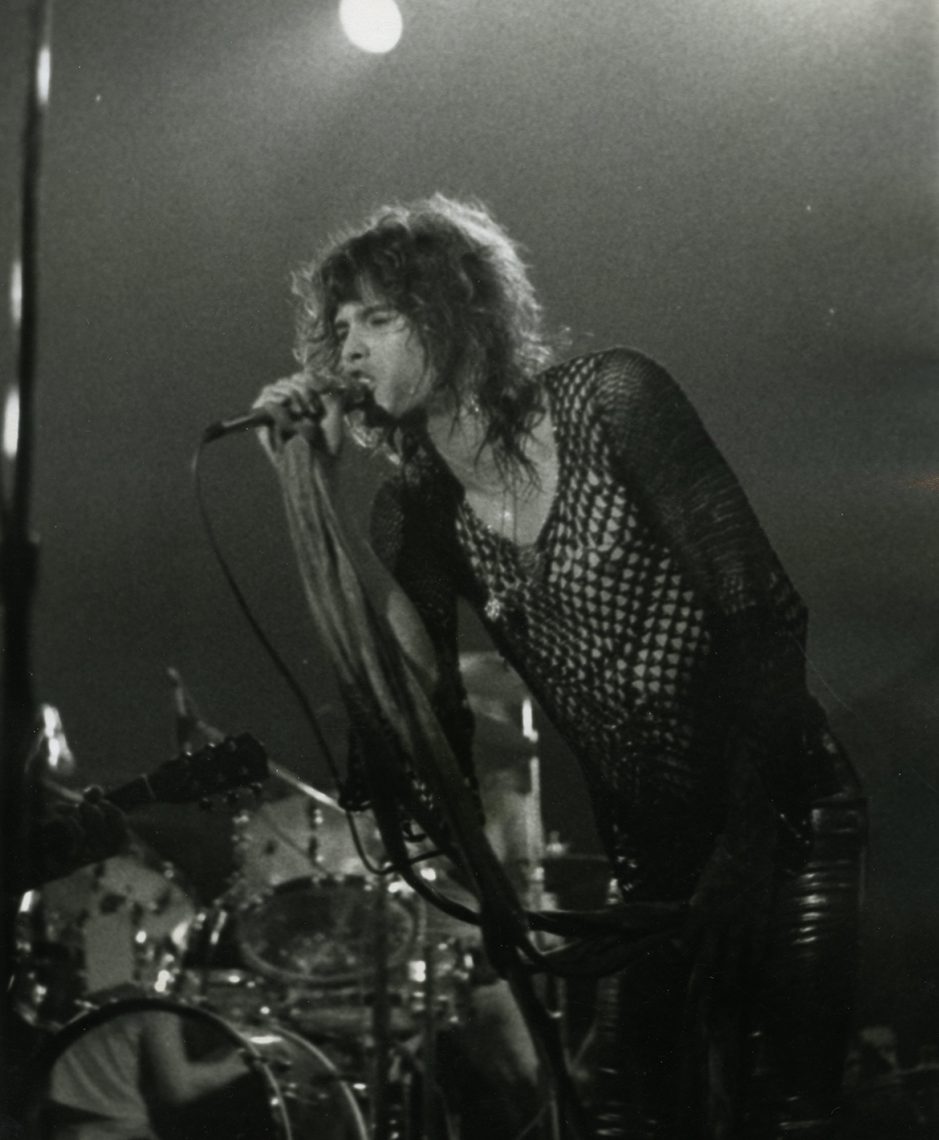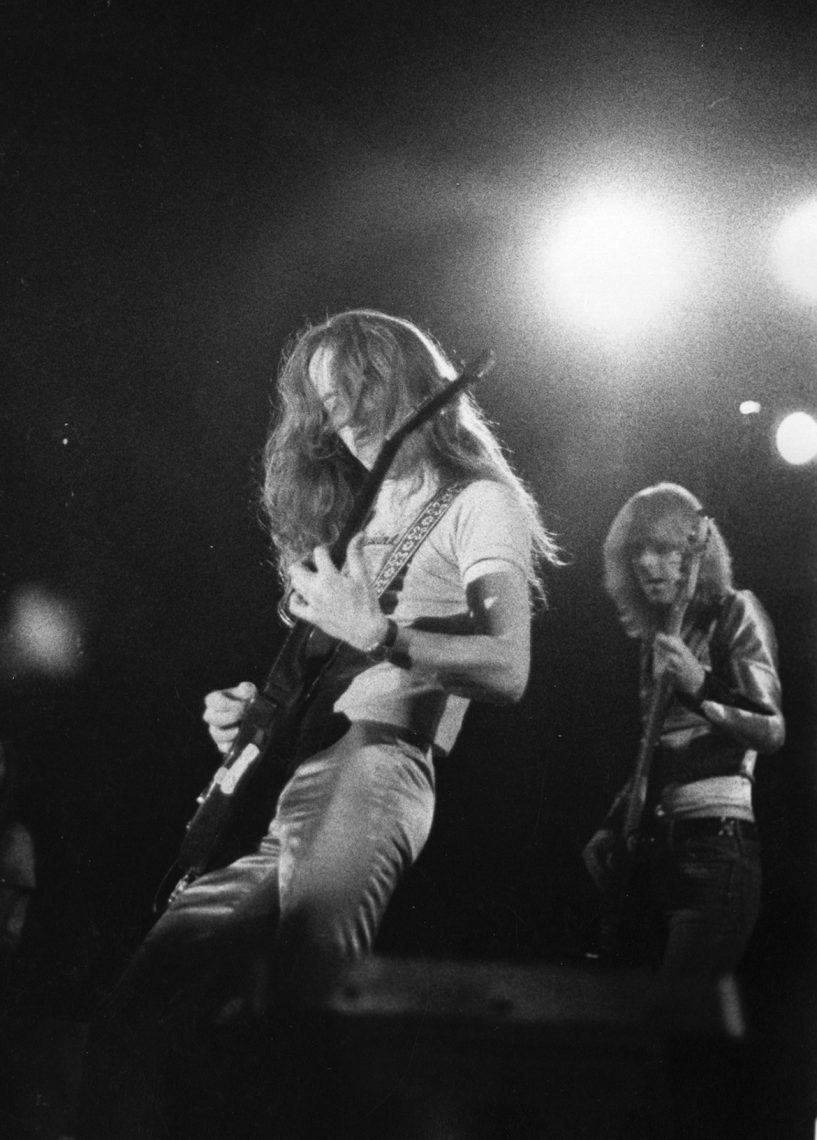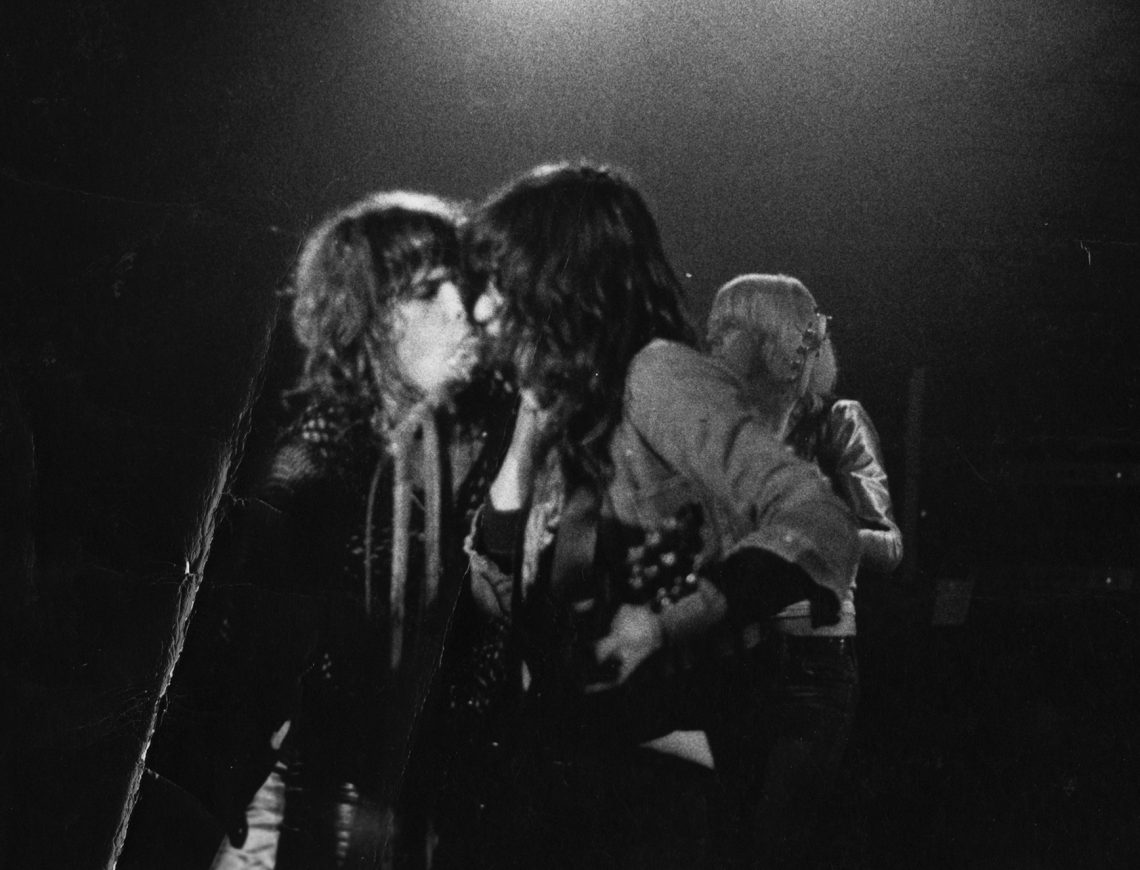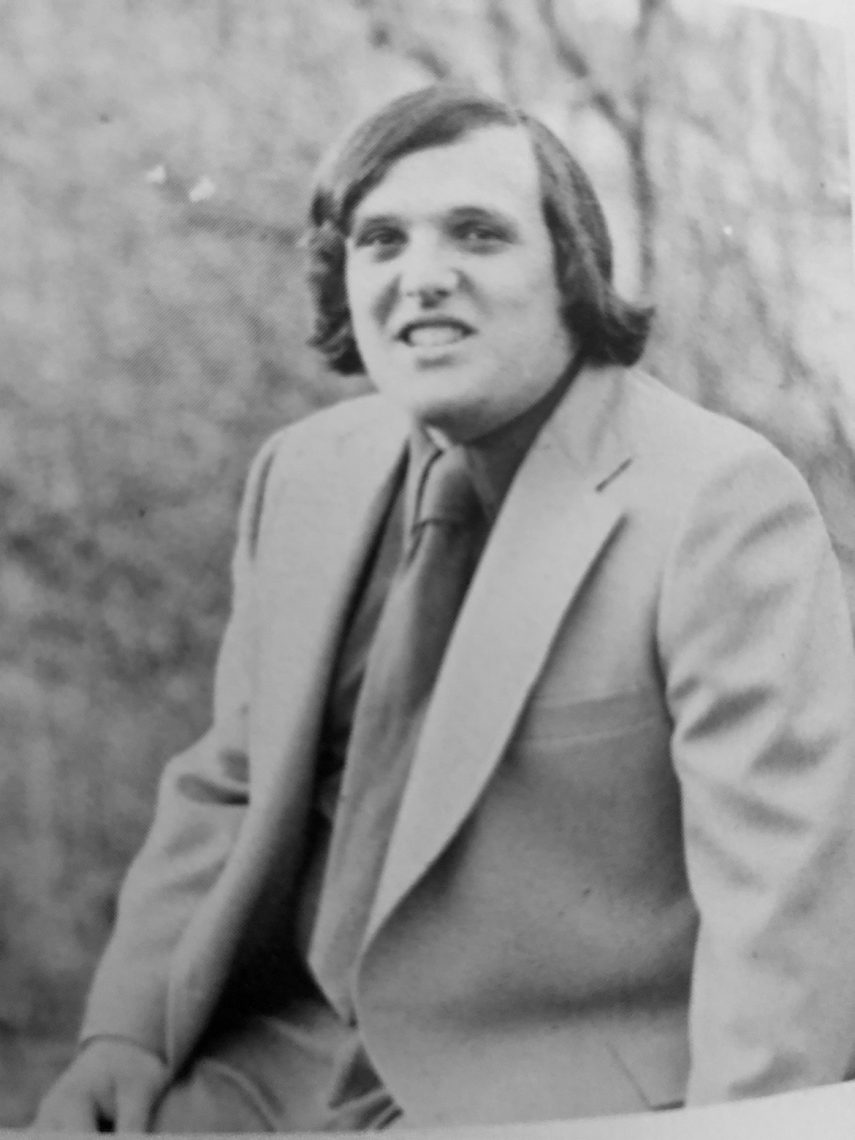Forty-five years later, former Student Senate Social Chair Tullio Nieman ’76 gives us an all-access, backstage-pass account of how the Bad Boys from Boston came to rock UMF — for $3 a head.
By Marc Glass, February 2019
For alumni who experienced Winter Carnival of yore at UMF, February likely holds a special place in their hearts. It was a time to let down one’s (probably longish) hair, show some school spirit, and revel with one’s Best Farmington Friends.
The 1974 docket of fun and frivolities, like most of the bygone era, featured a snow-sculpture competition, semi-formal dance, and talent show with performances by student members of the wildly popular group TDX, The Designed Xpression.
But 45 years ago this month, Student Senate Social Chair Tullio Nieman ’76 planned — and pulled off — something extraordinary to cap off the Winter Carnival activities that year: He arranged for the now-legendary rock band Aerosmith to play to a packed Dearborn Gymnasium at UMF.

Aerosmith lead singer Steven Tyler belts out a crowd-pleaser in UMF’s Dearborn Gymnasium. (All Aerosmith photos courtesy of Potluck, the 1974 Yearbook.)
By booking the band, which was enjoying rapidly growing fame and fortune after the release of the early hit “Dream On,” Nieman secured his status as a campus legend — as a sophomore. (The lone person who may not have been keen on the concert was former Athletic Director Roger Wing. But when all was sung and done, Nieman even got an attaboy from him. More on that in a moment.)
For Nieman, who went on to a 40-year career in higher-education administration that included stints as Director of Student Activities at Norwich University, Fitchburg State, and Colby College, as well as Dean of Students at Endicott College, bringing Aerosmith to UMF was an exercise in winging it.
“All my friends in Scott gave me a ton of help,” recalls Nieman, who counts Tribe Called Quest, De La Soul, RUN DMC, Crowded House, Blues Traveler, Phish, Guster, and the Stone Temple Pilots among the acts he later booked at various colleges and universities. “Back in those days there were no student activities directors or staff members to assist you. I signed all the contracts myself which, looking back on it, was probably illegal.”
Now, Nieman is ready to give us an all-access, backstage-pass account of how the Bad Boys from Boston came to rock UMF — for $3 a head.
The genesis for going after Aerosmith:
I remember this one classmate in particular, Donald Johnson ’76 from Rumford, and he kept talking about this band Aerosmith, saying, “They might be really good.” And then he talked about another band called Foghat. So I started playing a little bit of their music on my show, on WUMF, and I thought, they’re not too bad. Then Donald started talking about ZZ Top, and I already knew about them because they had a new album out at the time called Tres Hombres. So, I thought, well OK, I’ll see what I can do.
How it might have been ZZ Top AND Aerosmith at UMF in February 1974:
I picked up a phonebook and looked up “entertainment,” and the only thing I saw there was an agency in Boston called Lordly & Dame Inc. So I called them on the phone and I can remember talking to the agent like it was yesterday because his name was Freddie Johansen, and he had an accent — a cross between someone from England and someone from Australia. So I mentioned the bands we had talked about, and he thought that maybe we could get both Aerosmith and ZZ Top together for probably between $7,000 and $10,000. So then I went to my treasurer of the Student Government Association, Matt Levasseur ’76, and he said, “Well, you’ve got X amount of dollars in the treasury. If you sell big-time tickets to something like that, we should be able to do it.” So, I went back to Freddie, and he said, “OK, I’ll put the offer through.” Then, he said, “Who would you want to have go on first?” And I said, “Well, Aerosmith is really big in New England right now,” because they had just come out with “Dream On,” which was their seminal hit I guess you’d say. They were big all over New England, although nationally they weren’t that well known yet, whereas ZZ Top was. But I thought, if we’re going to sell out the concert, we better put Aerosmith at the lead. So he made that offer to both bands, and they both said they would do it, but ZZ Top wouldn’t be second act. They would only do it as the first act. I remember thinking it’s just not worth doing it that way, because if it doesn’t work out and we take a bath, we couldn’t afford to lose that much money. So, we decided we’d just go with Aerosmith.

Brad Whitford and Tom Hamilton in sync with each other and the 1974 Winter Carnival crowd at UMF.
How the OPEC Oil Embargo of 1973–74 sowed doubt and disbelief:
The morning of the concert, the road manager from Aerosmith called to say, “We don’t know whether to fly or to drive up.” I remember telling him on the phone, “Well I don’t know where you’re going to fly to, because there’s no airport here.” He said, “Well, we’re not going to be able to get gas,” because this happened to be in the middle of the OPEC Oil Embargo, and at the time, though it doesn’t seem like much today, gas on the Maine Turnpike was selling at $1 a gallon, which was tremendously high. A couple months earlier it had been $0.35 a gallon. And at the time there were limits on how much gas you could buy at each station on the Turnpike. So I said, “Well, I can tell you this, we have plenty of gas in Farmington.” He says, “What are you talking about?” and I said, “Well, we’ve got plenty of gas.” He says, “You’re kidding,” and I said, “No. I’ll tell you for the third time, we have plenty of gas.” He says, “Well, where do you have plenty of gas?” I said, “At The Trolley Diner,” which was down by Hippach Field. Then he says, “Well, I don’t believe that.” To which I said, “Well, then do what you got to do. If you don’t want to come, then you better tell me, but you’re not going to get your money, and you’re not going to reschedule it because it’s our winter carnival.” So he hangs up the phone and then five minutes later the phone rings again, and I said, “OK, what do you want now?” And he says, “You’re sure we can get gas?” And I said, “I’m sure we can get gas, I have no doubt we can get gas.” “What if they run out?” he says. I said, “Do you have enough gas to get here?” And he says, “Oh, yeah.” So I said, “Well then come, do the show, if you can’t get gas, we’ll get it the next day.” When the limo drivers showed up later that day with the band, the first thing they insisted we do was go to the Trolley Diner to get gas.
How Aerosmith got a taste of Arkay while in Farmington:
I had arranged, according to the contractual agreements, to get the band a green room and food. I went to Errol (Farmer), over at Arkay Pizza, whom I knew because I used to go shopping there all the time. He was a really good guy, so I gave him a catering contract of what we needed. He asked me how much I wanted to spend. I had no clue, but I said, “I guess about $200,” which I think was a lot for that time, and probably a lot for Errol. The only thing I was firm about was no alcohol. I struck it from the band’s contract. Errol put together three or four boxes of food, including all sorts of sandwiches. He did a great job. He just knew it was for a band. I don’t know if he knew who Aerosmith was. I told him who it was for, but I don’t think it would have made a difference with him one way or the other, because I just think he wanted to do a nice job for the money and for me, which I appreciated.
How teamwork made the Dream (On) work:
People were really looking forward to the show with anticipation. When they came in, everybody sat on the floor of Dearborn Gymnasium because we didn’t have any chairs. So it was body-to-body on the floor, right up to the stage. We weren’t even sure if we had exceeded the fire-code capacity or not. The only person I could see in a chair was Roger Wing, the athletic director at the time, in the back. He wasn’t mean, but he made it clear he wanted no part of a concert like this in his gym. He had this great swivel chair he used to sit in all the time, and he sat right near his office inspecting the whole scene. The opening act, The Repairs, played for 35 to 40 minutes, and I think they could have sung anything — even “Old McDonald’s Farm” — and people would have been happy because they knew Aerosmith was coming. When it was their turn, I introduced Aerosmith on stage, and the place just went nuts. They played a really long show, considering the fact that they were fairly new and I didn’t know how much material they had. They played for at least an hour and 45 minutes and got a standing ovation. When they came back for encores, I remember Steven Tyler turning to Joe Perry and saying, “You’d think this is New York City or something!” They played “Dream On” for the encore, and I have to admit when they played that song, I thought, Wow! This is the culmination of quite the weekend. Everybody’s having such a good time, and I had something to do with it. But I was more happy that my friends had a lot to do with it, too, because they really enjoyed themselves, and I could tell that we had been a part of something big that they really enjoyed. One of the nicest things I remember was the fact I had so much help from all these kids. I basically felt like a Hollywood director. All I had to do was ask people to do something and they dropped what they were doing to help. I couldn’t have done it without Mark Capano ’78, Mike Wing ’82, Ernie Panscofar ’75, Denny Stanley ’76 and Ron Milliken ’75, who were my roommates, Cyndi Sperling Farris ’76, Nancy Graves McKay ’76, and Carlene McLaughlin ’76, who co-chaired Winter Carnival that year. And when I say they helped me, I mean they put the stage together, made changes between acts — just about anything you would ask them to do. I can remember Capano walking around with a screwdriver in his hand when they had to put parts of the staging together. Cindy and Nancy worked tickets at the front door. And Matt Levasseur, the treasurer, was a great person to be there, just to help get us through the day more than anything else.

“I remember Steven Tyler turning to Joe Perry and saying, ‘You’d think this is New York City or something!'” says Nieman.
And, finally, how Roger Wing was won over (sort of):
Aerosmith did a great job. And before they pulled away from UMF, both limo drivers came out to thank me again for the gas, which I thought was classic. So, I went back inside the gym, and who’s there but Roger Wing. He comes up to me and says, “That may have been the worst music I’ve ever heard in my life, but you did a good job.” We made sure there wasn’t a speck of anything in the gym, and he said, “Thank you, and you can do another concert here sometime.” I think what he was giving me was his stamp of approval, which was nice, because Roger, if you knew him at all, was a pretty stern guy. Being athletic director is not an easy job. After the concert, I have to say, I was about as tired as I can ever recall feeling when I was in college — too tired to even make it back to the house we were renting on the Holley Road. The guys I was with from Scott gave me a room to crash. They just put a mattress on the floor, and gave me a sleeping bag, and I think I slept until about 3 p.m. the next day, at least. The only reason I got up was because the last thing we had for Winter Carnival was a movie night over in Roberts Learning Center. So I went over there just to introduce the movie, and there was hardly anybody there, because I think they were all tired from the rest of the weekend and the concert. So I made my way back to Scott, and just about everybody I encountered was talking about what a great night it had been. The guys from The Repairs, the opening band, stayed the night in Scott. I remember they were worried about whether their show was good or not, and I didn’t have the heart to tell them no one really cared. So, it was really something that I’ll never forget, and in a lot of ways it resulted in me becoming the president of the student senate later on, because I think there were a lot of pleasant memories from that night. People felt good about it.

Looking back, Student Senate Social Chair Tullio Nieman says he was pleased with the event, but “I was more happy that my friends had a lot to do with it, too, because they really enjoyed themselves, and I could tell that we had been a part of something big that they really enjoyed.”

